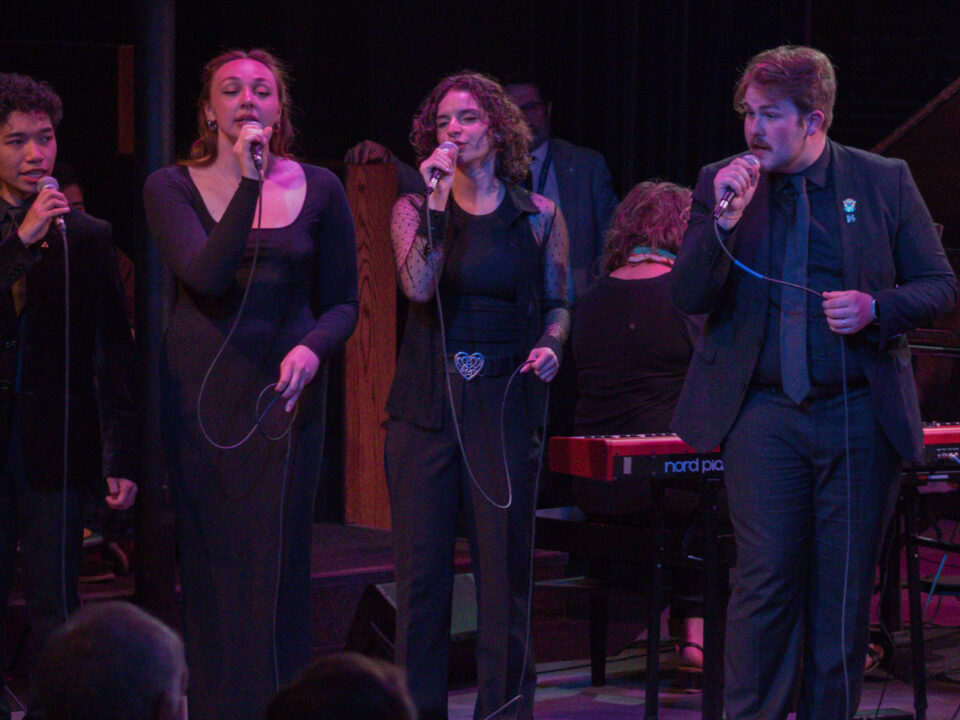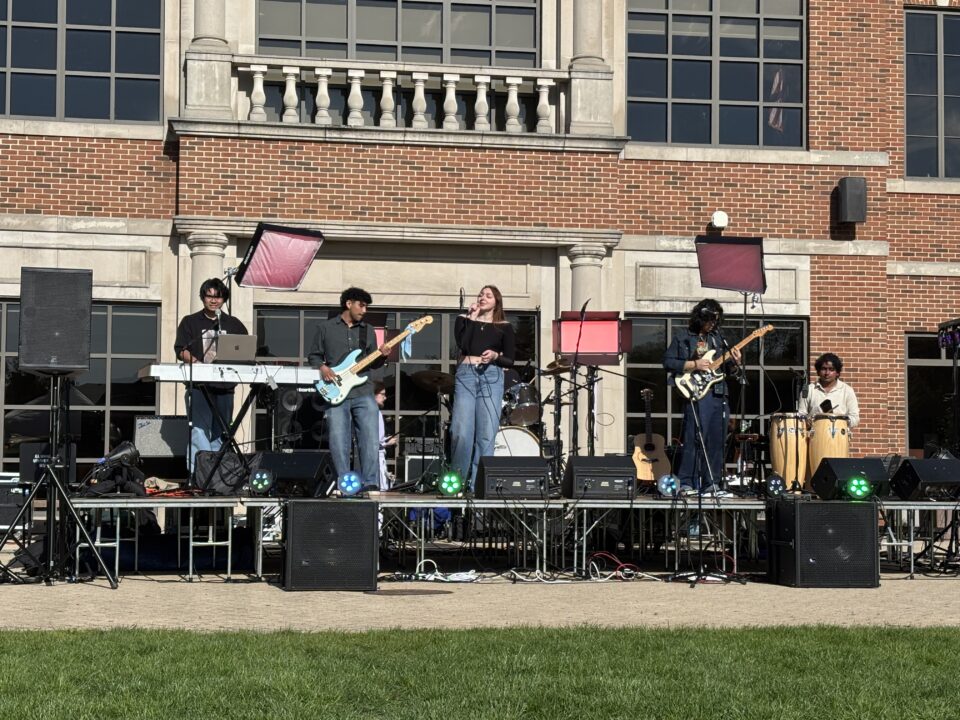Is Riot Fest Tone-Deaf? Many Residents Are Disappointed at RF’s Return to Douglass.
Riot Fest organizers calculated that over 500,000 people attended the festival at Douglass Park after almost changing the venue to Bridgeview. From Sept. 20-22, many people created fond memories at the fest, such as the 44 couples who married this year in RF’s stained-glass-paneled chapel. However, some community members who reside in Little Village and North Lawndale have complicated feelings about RF’s recurring presence since 2015.
The festival’s official website outlined its history. RF began in 2005, created by Mike Petryshyn and Sean McKeough. Initially, they utilized multiple Chicago venues such as the Congress Theater, the Metro, Double Door, Subterranean, Cobra Lounge, and more.
In 2012, RF was moved to Humboldt Park, which lasted only three years after community pushback regarding gentrification and the privatization of public spaces.
An independent political organization formed by community residents called Grassroots Illinois Action-Humboldt Park Area (GIA-HPA) was a significant force behind RF leaving Humboldt Park. Linda Lopez, a member of GIA-HPA, wrote about why they organized to remove RF from the park in a magazine called “In These Times.”
GIA-HPA collaborated with groups like Humboldt Park Citizens Against Riot Fest to pressure the festival organizers to listen. They created a public petition, held press conferences, challenged commissioners of the park board meeting, and a large number of community members attended Alderman Roberto Maldonado’s ward nights.
“Residents stood up against the privatization of their park by Riot Fest and won,” Lopez stated. “They can stand up against the gentrification that is displacing the poor and erasing the presence of people of color. While our efforts are centered on our community, these issues are widespread.”
The festival moved to Douglass Park in 2015, where it remained as of this year. However, there is similar resistance from the community residents.
Anton Adkins, a resident and community organizer, spoke with The Leader about his thoughts on Riot Fest.
“We have gotten this far and garnered this much attention because the people of the community have spoken out,” Adkins said. “Not everyone is willing to step in front of a camera or give an interview but we know what the people want because they’ve told us so. We carry their message when we speak.”
But does RF listen to the community?
On Aug. 2, Scott Fisher facilitated the first community engagement meeting since the festival arrived in 2015. Fisher founded and is president of Special Event Services Group, RF’s primary service provider, according to contracts signed between the Park District and RF in 2015 and 2016. Fisher stated that would be “the only community meeting” leading up to the festival.
The Chicago Reader reported that “residents complained that the meeting was poorly advertised, lacked structure, and ignored their concerns.” It was noted how Fisher sent out flyers just a week before the meeting.
A long-time resident named Denise Ferguson explained to the Chicago Reader that the meeting’s structure caused a disadvantage to community members.
“It took place at about 12:30 on a Tuesday afternoon; a few people here had to take off from work to attend,” Ferguson said. “Most of the neighbors who live across the street, who are directly impacted by the festival, aren’t here and probably didn’t know about it.”
As questions were being asked, Fisher stated, “Listen if you can’t understand pure English and the fact that I can’t answer that question..” before getting cut off by the noise of angry residents. There was no Spanish translator, leaving many residents who primarily speak Spanish out of the conversation.
In the aftermath of this meeting, Fisher stepped down, and RF spokesperson Heather West released a statement to the public.
“We don’t condone the tone and apologize to the Douglass Park community as it is not reflective of RF’s values or any of our past work in the park,” West stated. “We respect the concerns of the neighbors and want to make sure they are heard and addressed.”
A second meeting for community members allegedly took place virtually on Aug. 4. However, no sources have reported any of the information stated in this meeting.
Another resident named Jose Manuel Almanza explained to the Chicago Reader an additional disadvantage RF causes the community.
“One thing that’s not talked about are the food vendors that provide food for the people who come to the soccer games,” Almanza stated. “Those vendors have to pay a small fee to sell their food here. Now during the summer, those vendors lose access to their income and nobody matches that. The city doesn’t give them a discount, give them their money back, or give them an alternative. They just get shut out.”
While local vendors do not get discounts, RF does.
The Freedom of Information Act acquired the Chicago Park District’s RF permit documents. According to these documents and Chicago Reader calculations, every year since 2015, RF has paid $248,000 on average in permit fees.
To demonstrate the significant cost deductions, an approved permit contract revealed that in 2015, RF received over two million dollars in discounts from the Chicago Park District’s Department of Revenue. The charges went from around $2.3 million to $233,508. Additionally, the taxes are noted to be zero on the document.
A similar situation happened in 2016 with the permit contract revealing that RF received over two million dollars in discounts again. The charges went from around $2.4 million to $212,079.65 — taxes are also noted as zero again.
But does any of this money go back into the community?
“The 24th Ward has historically suffered from a lack of resources, whether that is quality schools, jobs access, or health. Riot Fest has been able to find “favor” by applying a band-aid to these systemic injustices by doing the easiest thing they can do, pass out money or access to it,” Adkins stated. “They know the harms of this community and their “investment” is as predatory as any loan shark: money with strings attached. This has not moved the community along, but it has only allowed the alderwoman, Monique Scott, to look good as Riot Fest passes out sugar treats when true nourishment is needed.”
Scott Braam, a faculty member of Elmhurst’s Political Science and Urban Studies Program, shared his thoughts with The Leader.
“Community activist groups feel that music festivals are not the answer to the harsh socioeconomic conditions that everyday people have to endure in the neighborhood,” Braam said. “They want to see the Mayor fight as much for them as he fought to keep the festival in Douglas Park. They feel the city ignores Douglas Park 11 months out of the year and are insulted by the notion that this festival helps the community in a meaningful way.”
When The Leader asked Adkins what he would like to say to RF, he shared a passionate message.
“You all need to find a new home. Shamefully, the CEO of Riot Fest does not come to our community, so any word he has ever spoken about our home is what he’s heard, and not what he knows from experience,” Adkins said. “I have told them once, and I’ll tell them again: You know that you are profiting off of generations of systemic injustices and there’s no form of charity that will remove your name from the history books as predators in this system. You all have taken advantage of this community for eight years and we will never forget it. We want you out of our community!”


